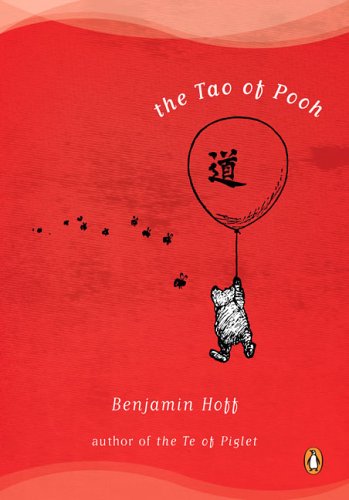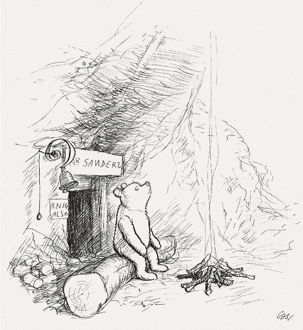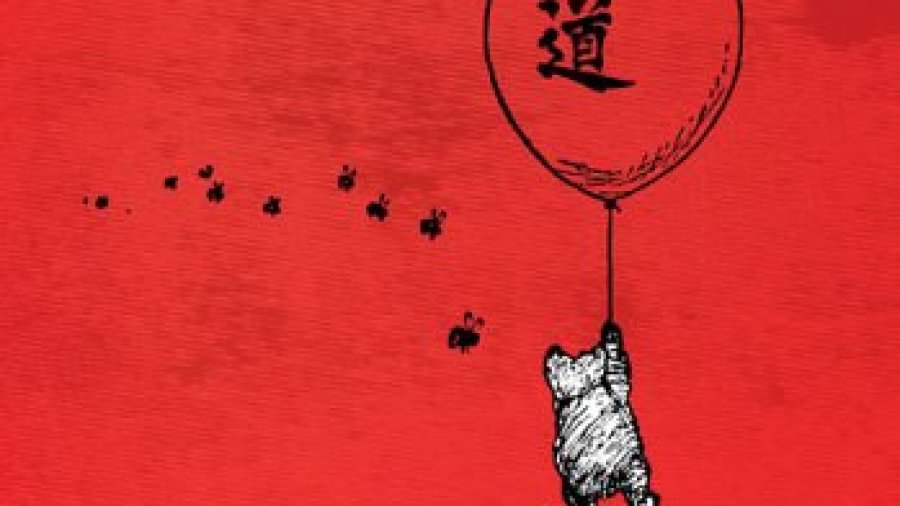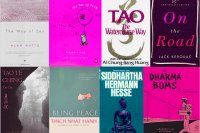“There was once a stonecutter who was dissatisfied with himself and with his position in life . . .”
Recently, I read a book called The Tao of Pooh. This charming little book is centered on the premise that one can understand the fundamentals of Taoism through a close reading of Winnie the Pooh, the classic children’s book series.
In the book, the author attempts to demonstrate the truth of this premise by engaging examples from the Pooh stories and writing a dialogue between himself and the sweet yellow bear.
 The short volume turns out to be a fairly accurate introduction to the central tenets of Taoism, though it isn’t without its flaws (see my brief review on Goodreads for more). Still, I enjoyed the book and especially appreciated the inclusion of various passages and anecdotes from other texts.
The short volume turns out to be a fairly accurate introduction to the central tenets of Taoism, though it isn’t without its flaws (see my brief review on Goodreads for more). Still, I enjoyed the book and especially appreciated the inclusion of various passages and anecdotes from other texts.
The Stonecutter Tale
One such anecdote included in The Tao of Pooh is an old Chinese folk tale called The Stonecutter. Here is the story in full:
“There was once a stonecutter who was dissatisfied with himself and with his position in life.
One day he passed a wealthy merchant’s house. Through the open gateway, he saw many fine possessions and important visitors. “How powerful that merchant must be!” thought the stonecutter. He became very envious and wished that he could be like the merchant.
To his great surprise, he suddenly became the merchant, enjoying more luxuries and power than he had ever imagined, but envied and detested by those less wealthy than himself. Soon a high official passed by, carried in a sedan chair, accompanied by attendants and escorted by soldiers beating gongs. Everyone, no matter how wealthy, had to bow low before the procession. “How powerful that official is!” he thought. “I wish that I could be a high official!”
Then he became the high official, carried everywhere in his embroidered sedan chair, feared and hated by the people all around. It was a hot summer day, so the official felt very uncomfortable in the sticky sedan chair. He looked up at the sun. It shone proudly in the sky, unaffected by his presence. “How powerful the sun is!” he thought. “I wish that I could be the sun!”
Then he became the sun, shining fiercely down on everyone, scorching the fields, cursed by the farmers and laborers. But a huge black cloud moved between him and the earth, so that his light could no longer shine on everything below. “How powerful that storm cloud is!” he thought. “I wish that I could be a cloud!”
Then he became the cloud, flooding the fields and villages, shouted at by everyone. But soon he found that he was being pushed away by some great force, and realized that it was the wind. “How powerful it is!” he thought. “I wish that I could be the wind!”
Then he became the wind, blowing tiles off the roofs of houses, uprooting trees, feared and hated by all below him. But after a while, he ran up against something that would not move, no matter how forcefully he blew against it – a huge, towering rock. “How powerful that rock is!” he thought. “I wish that I could be a rock!”
Then he became the rock, more powerful than anything else on earth. But as he stood there, he heard the sound of a hammer pounding a chisel into the hard surface, and felt himself being changed. “What could be more powerful than I, the rock?” he thought.
He looked down and saw far below him the figure of a stonecutter.”

Pooh Bear isn’t concerned with power. Via Wiki Commons
Impressions and Analysis
The philosopher Friedrich Nietzsche would’ve likely approved of this story. One of Nietzsche’s most memorable concepts is that of the “will to power”, which describes what Nietzsche apparently thought was the primary driving force of human nature: namely, the desire to be superior, to reach the highest possible position in life.
In The Stonecutter, the will to power can be identified as the crux of the narrative action. Initially and throughout his transpositions into other lives and entities, the stonecutter yearns for more power than his current state allows. With each state change, he remains unsatisfied, always noticing a seemingly more supreme position to desire. However, in accordance with the often cyclical aspects of Eastern philosophy, the stonecutter ultimately returns to his starting position and realizes that he had always possessed great power.
Thus the story suggests a few things about power and contentment:
1. Power is always relative.
“Powerful” and “weak” are terms that derive their meaning only in a relational context, a comparison. In the story, the cloud becomes “powerful” in relation to the sun, but it also becomes “weak” in relation to the wind. The stonecutter is “weak” compared to the high official, yet “powerful” compared to the boulder.
This suggests that we are always simultaneously “powerful” and “weak”, depending on our criteria for “power” and the object of our comparison. An American of modest income might call themselves “weak” because they measure “power” primarily in terms of wealth and compare themselves to Warren Buffet. Another American with the same income might call themselves “powerful” because they measure “power” in terms of having their basic needs met and compare themselves to a homeless person.
2. Power is illusory.
So “power” ends up being an illusory concept because it is based entirely on the arbitrary terms of a comparison. When scrutinized closely, the word collapses in on itself. What is power to one is weakness to another, and vice versa.
Power is illusory in a second sense, as well. If we decide we need more “power” (in the sense of status, superiority, prestige, dominance), like the stonecutter, we will necessarily compare ourselves to other people whom we imagine possess more power than us. As is depicted in the story, these comparisons will be unending. Rather than highlighting our assets, they will only reveal our shortcomings, and the power we seek will always elude us.
3. Contentment can only come from acceptance of what we already are.
The stonecutter’s desire to be something other than what he is results in dissatisfaction. Despite his wishes being granted repeatedly, he remains discontented, continuing to see his gratification existing in the next thing, the higher status, the sexier strut.
The conclusion to the story suggests that each of us contains sufficient worth, if we perceive ourselves correctly. It also suggests that contentment can only arrive when we have ceased to indulge in petty comparisons and stopped imagining fulfillment arriving with the next thing.
These fairly common precepts are echoed in the works and stories of many other writers in myriad literary traditions, yet they seem eternally difficult to internalize, especially in a world that is always focusing on “the new look”, “the next big thing”, the “better you”, etc.
The Stonecutter suggests that these messages are ultimately hollow and misleading. Covertly, it conveys to us a simple message, the same one written 2600 years ago by the great Taoist sage, Lao Tzu:
“Be content with what you have;
rejoice in the way things are.
When you realize there is nothing lacking,
the whole world belongs to you.”If you appreciated this, you might wish to receive free updates from Refine The Mind.
About Jordan Bates
Jordan Bates is a Lover of God, healer, mentor of leaders, writer, and music maker. The best way to keep up with his work is to join nearly 7,000 people who read his Substack newsletter.





I love this.
Glad to hear it, venus. 🙂
some of my best early childhood memories… lying in bed, and my mother reading “Winnie the Pooh” to me… I believe it had an enduring effect on me.
Same, Francis. My parents read me stories every night, and I’m certain it was a formative experience.
As I’ve been planning my 2014 goals & dreams, it’s great to have this kind of reminder as to what is really important, & that power is all relative. Thanks for this.
JesLacasse,
You’re very welcome! So glad it could help you in some way. All the best in 2014.
The power of storytelling to purvey a message is immense. As Hemmingway once said, “If a writer [..] knows enough of what he is writing about he may omit things that he knows and the reader, if the writer is writing truly enough, will have a feeling of those things as strongly as though the writer had stated them.” I think this little anecdote is a really nice example of that and I really enjoyed reading your analysis of it.
Jamie!
Realized I’ve forgotten to reply to your comment. I agree on the importance and power of story-telling. Truly can’t be overstated.
I like the Hemingway quote, and I think you’re right that this story exemplifies that. Cheers.